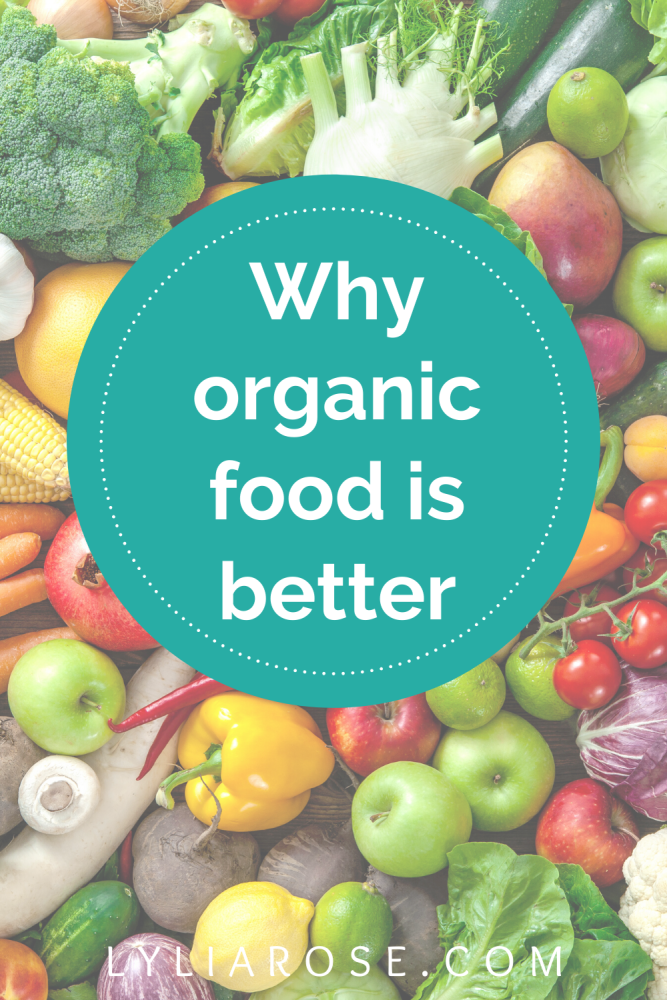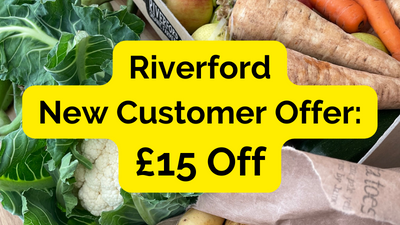Why I Prefer Organic Food
Posted on

Why Organic Food is Better For You (& Worth the Cost)
I try to eat as much organic food as possible. We started eating organic food at the end of 2014, and I then really started researching why organic is better for us. Before, I never gave much thought to the organic section in the supermarket, but after learning about it, I understand why organic food is better for both health and the environment.
Since then, we've regularly ordered an Abel & Cole organic vegetable box or a Riverford organic veg box, and it has inspired us to make even more organic choices. If there's an organic option, we buy it. I now firmly believe that organic food is better for you, and that it's something we should all consider adding to our diets and investing in for our health, and more reasons.
Read on to discover why organic food is better when it comes to healthy eating and whether it’s worth the cost.
What is Organic Food?
Organic food is food that has not been treated with harmful chemicals like pesticides or artificial fertilisers. It’s also never genetically modified. Why organic food is better goes beyond just health—organic farming practices focus on crop rotation to maintain fertile soil and promote natural pest control, which is much more sustainable for the planet.
Organic farm animals truly are free-range, and wildlife is encouraged to thrive. Organic food is better for you, not just because of what’s excluded, but because of the natural methods used to grow and farm it. Plus, when you eat organic, you're supporting a farming model that’s better for the environment.
Why Organic Vegetables Are Better
It’s not just about avoiding chemicals—why organic vegetables are better lies in their flavour and nutritional value. The organic vegetables we get from Abel & Cole taste far better than regular supermarket options. The apples, for example, have an incredible taste that regular store-bought apples just can’t match. The potatoes in our organic roasts are a highlight, with a richer flavour that we didn’t know we were missing until we tried them.
It’s also important to note that organic food is better for you because of its nutrient density. Studies have shown that organic fruits and vegetables often contain higher levels of important nutrients such as antioxidants, vitamins, and minerals.
Why Do People Prefer Organic Food?
More and more people are choosing organic, and it’s not hard to see why. Why do people prefer organic food? For many, it’s a concern about the pesticides and chemicals used in conventional farming. But beyond that, why do people prefer organically grown fruits and vegetables also has to do with the taste, as I mentioned above, and the peace of mind knowing that their food has been grown without artificial fertilisers and genetic modification.
Choosing organic is not only about eating healthier but also supporting ethical, sustainable farming practices. When you buy organic, you are voting for a healthier world—one where our food, environment, and wildlife are protected.
Is Organic Fruit and Veg Better for You?
Yes, organic fruit and veg are better for you for a few reasons. Not only do they contain fewer chemicals, but the farming methods used also lead to healthier soil, which in turn produces better, more nutritious food. The food we consume from the earth is only as good as the soil it comes from, and organic farming ensures that the soil is fertile and free from the toxins often found in conventional farming methods.
Organic Food: Why is it Better?
There are many reasons why organic food is better. As well as being free of pesticides, herbicides, and genetically modified organisms, organic food is grown with methods that support the environment. Organic farming promotes biodiversity and soil health, ensuring that we’re consuming food that has been grown sustainably.
Non organic food contains harmful residues of pesticides. Shockingly, as we import a lot of food, imported foods often contain twice as many cancer-linked pesticides compared to UK-grown produce. A recent study revealed that these imports frequently exceed UK safety limits for pesticide residues, raising concerns about the long-term health effects. This highlights the risks of consuming non-organic imported fruits and vegetables and the importance of choosing organic options when possible. For more details, you can read the full article on PAN UK's website.
The Cost of Organic Food
One common concern is the cost of organic food. Yes, organic food is expensive, but when you look at the long-term benefits, it’s worth it. We realised that cutting back on less healthy options—like takeaway food—and instead investing in organic produce has been a great way to spend our money on food that’s genuinely better for our health.
So, why choose organic food? Because it’s an investment not just in your own health, but in the health of the planet. While organic produce may be pricier, it's a price we are happy to pay to protect the environment and ensure the food we consume is natural and safe.
The Dirty Dozen
There is a list of 12 foods, known as the 'dirty dozen', which are most likely to contain high levels of pesticides. When choosing organic, these are the foods to prioritise. The list changes each year.
The 2024 UK Dirty Dozen list, compiled by PAN UK, highlights produce with the highest pesticide residues. Key items typically include fruits and vegetables like strawberries, spinach, lettuce, and peppers. For the full list and details, visit the PAN UK Dirty Dozen page.
The 2024 Dirty Dozen list in the US includes the following fruits and vegetables with the most pesticide contamination:
- Strawberries
- Spinach
- Kale, collard & mustard greens
- Grapes
- Peaches
- Pears
- Nectarines
- Apples
- Bell & hot peppers
- Cherries
- Blueberries
- Green beans
For more information and the complete list, visit the Environmental Working Group's website where you can find an even longer list of foods to avoid.
Whenever possible, try to buy these items organically as they are the ones most heavily contaminated by pesticides. Why organic foods are better is especially clear when considering the impact these chemicals can have on our health. The dirty dozen list can change each year, so check online for the latest list.
Should I Still Eat Non-Organic Fruits and Vegetables?
Yes, even if you can’t always buy organic, it’s still far better to eat fruits and vegetables—even non-organic—than to skip them entirely in favour of processed foods. They still offer numerous health benefits, including vital vitamins, minerals, and antioxidants. However, whenever possible, choose organic to ensure you're reducing exposure to harmful chemicals.
Abel & Cole Promo Code
For those wondering if it's worth the extra cost, I’ve discovered Abel & Cole promo codes that can help make organic produce more affordable. If you’re considering switching to organic, take advantage of these discounts to get the best prices on fresh, organic produce delivered right to your door. You can get 50% off two boxes!
Riverford Discount Code
Looking to try organic food? Use my Riverford discount code to save £15 on fresh, organic produce delivered to your door. Whether you’re buying organic vegetables or organic fruit, it’s a great way to enjoy why organic food is better for your health at a more affordable price. Eating organic doesn’t have to break the bank—grab my Riverford discount code and start making healthier, eco-friendly choices today!
Final Thoughts: Is Organic Worth It?
In conclusion, organic food is better for you in more ways than one. From its health benefits to its positive environmental impact, there’s a strong argument for why organic food is worth the cost. If you’re wondering whether to make the switch to organic, consider the long-term benefits of eating clean, chemical-free food.
More Healthy Eating Blog Posts:


